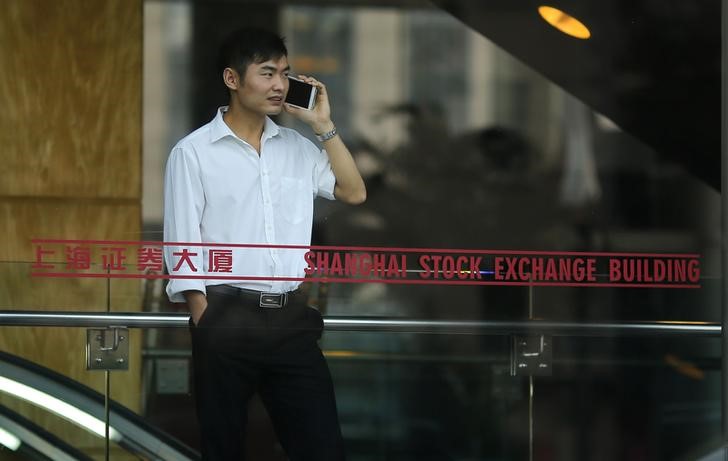By Luoyan Liu and Andrew Galbraith
SHANGHAI (Reuters) - Worries over a sustained bond selloff in China bled into the country's stock markets on Thursday, dealing blue chips their worst one-day loss in nearly 18 months, as investors reacted to the government's latest measures to reduce risks in the financial system.
The yield on Chinese 10-year treasury bonds (CN10YT=RR) touched a three-year high of 4.03 percent on Thursday, traders said.
The unease comes as the government steps up its deleveraging campaign, most recently with measures aimed at curtailing micro-lending and imposing tighter regulation on asset management businesses.
The blue-chip CSI300 index (CSI300) tumbled nearly 3 percent to 4,103.73 points, its biggest drop since June 13, 2016, while the Shanghai Composite Index (SSEC) slid 2.3 percent to 3,352.99 in its worst day since December.
"For the short term, the biggest worry in the stock market is Beijing's sweeping new rules to regulate the asset management business, which require financial institutions to set leverage limits on asset management products," said Yang Weixiao, an analyst with Founder Securities.
In some sectors such as healthcare and consumer products, analysts said the concerns provided a good opportunity for profit-taking after long run-ups.
The CSI index is still up 24 percent so far this year, while the SSEC is up 8 percent.
The selloff in mainland China snowballed into Hong Kong, where the benchmark Hang Seng Index (HSI) fell 1 percent after soaring above the 30,000 level on Wednesday for the first time in a decade. The China Enterprises Index (HSCE) lost 1.9 percent. (HK)
BOND ROUT
The yield on 10-year government bonds has risen nearly 40 basis points since the end of September.
A joint-venture fixed-income portfolio manager based in Shanghai said the bond selloff was the biggest adjustment for the market since 2010, though he suspected it won't get too much worse.
"But people are still afraid of the regulation factor. The market still wants to reduce leverage and keep cautious," he said.
"I don't think the government will save the market at this stage. It's just balancing between economic growth and financial market health... (and) I guess the government or the regulators are still focused on building a more healthy market."
The yield on 5-year AAA corporate debt <AAAIFR5YY=CDC> rose to its highest level in more than three years amid the selloff.
One of China's three policy banks said that it would postpone a bond issue originally planned for Thursday, a sign of the pressure some borrowers face as yields soar.
The Export-Import Bank of China (EXIM) said without elaborating that it would postpone a planned issuance on Thursday of bonds worth no more than 10 billion yuan due to "some reasons".
The 10-year yield on EXIM bonds <CN170303=> was 4.99 percent on Thursday, having risen more than 63 basis points since the end of September.
EXIM, owned by the finance ministry and central bank, plays a critical role in providing export financing and government-directed lending to other countries.
Higher rates are pushing up forward points on the yuan currency <CNY=CFXS>, even though spot yuan has been very stable.[CNY/]
